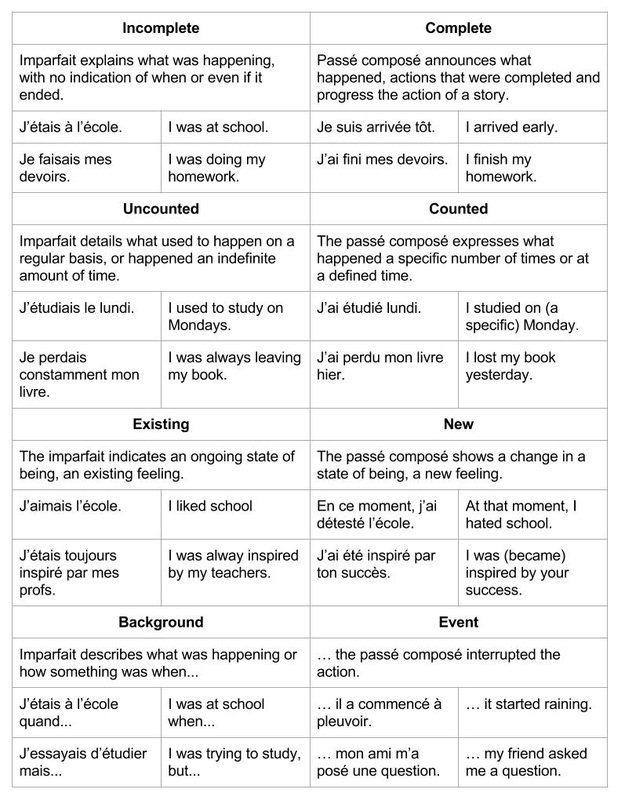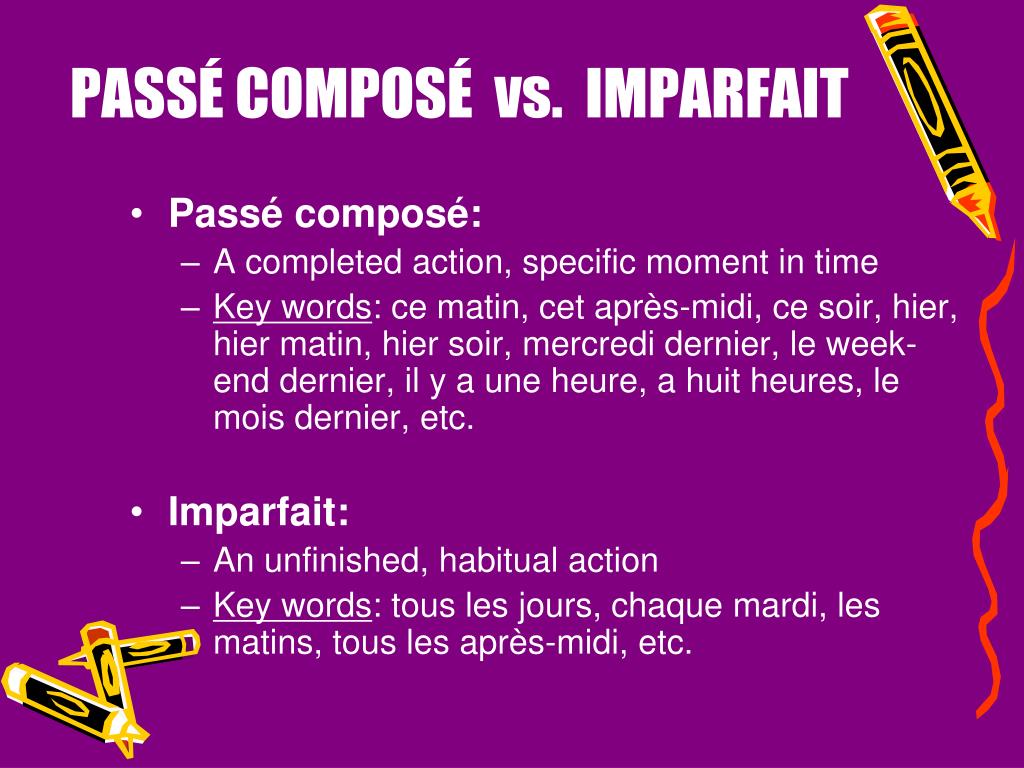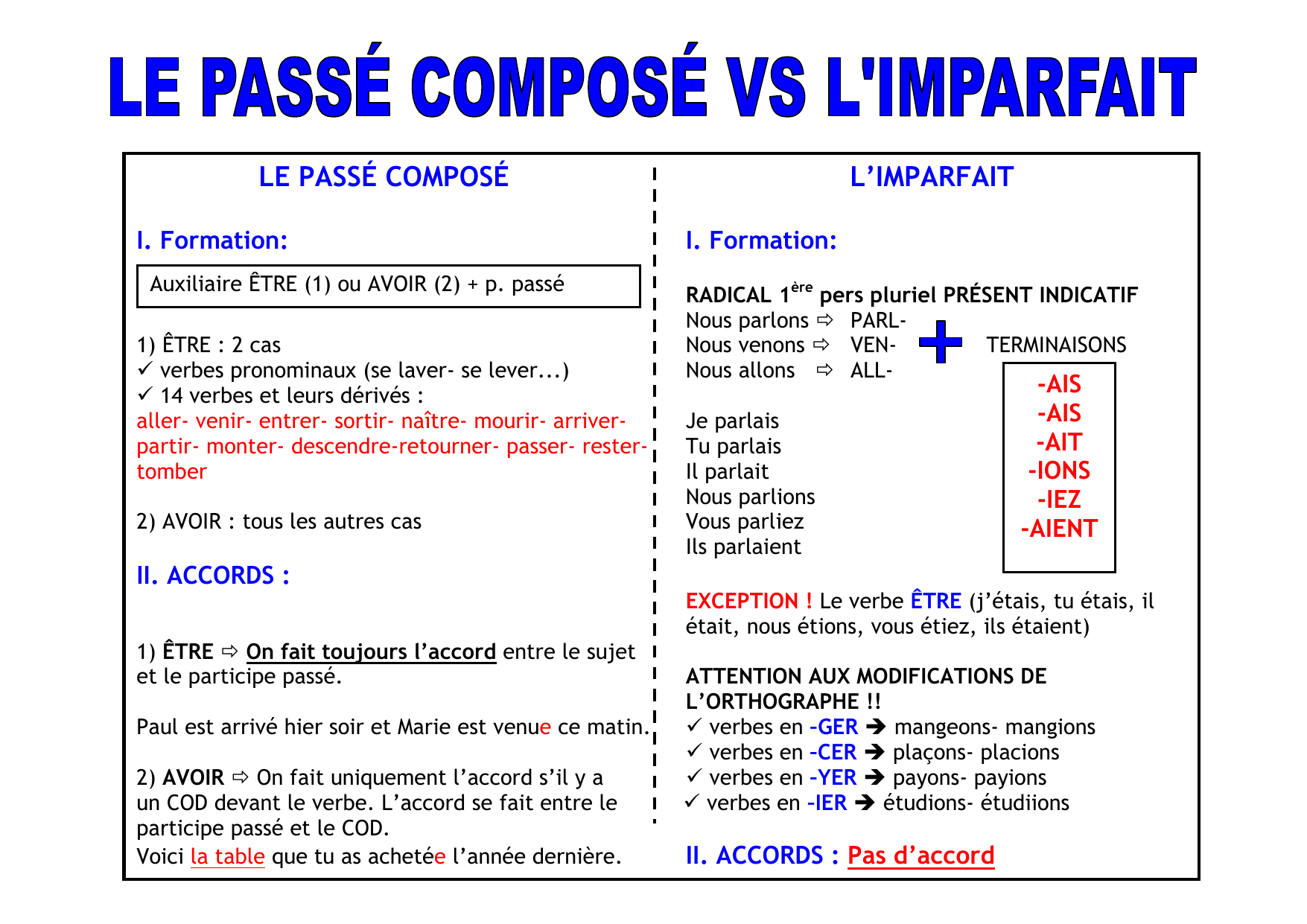
Passé Composé Vs Imparfait
Generally, the passé composé is used to relate events while the imparfait is used to describe what was going on in the past, states of being in the past, or past habits. All this takes on special importance in narration of past actions, when both tenses often occur in the same story. Narrating a story entails both describing a setting.

Pass Compos Or Imparfait Which One To Use Hot Sex Picture
It is time to practice combining the passé composé with the imparfait. This will allow us to tell stories that take place in the past. (a) On the one hand, the imparfait will helps us describe: (i) actions we used to do or did regularly: Chaque année, on allait chez mon grand-père à Dakar. (Every year, we used to go to my granfather's.

On parle français Le passé composé vs l’imparfait
There are several common past tenses in French, including the passé composé, imparfait, and plus-que-parfait.The plus-que-parfait, the "past before the past", generally translates directly into English, but when to use the imparfait vs. passé composé tenses tends to be more challenging for English speakers to determine. Many distinctions will intuitively make sense to most English.

L'Imparfait v. Le Passé Composé Le Cours de Francais
Conditions. We use the imparfait to describe conditions or the backdrop to the main action. This is one reason why the imparfait and passé composé are often used in the same passage or phrase—the imparfait sets up the main action by giving the background, while the passé composé is used for the primary, completed action.

Imparfait vs. passe compose; Does anyone have any idea what the right answers are and why and
Meanwhile, l'imparfait is more like the progressive past / continuous past. En 2012, je vivais en France. = In 2012, I was living in France. That's the main technique you can use to quickly decide whether to use the passé composé or l'imparfait. Both tenses are very common in both written and especially spoken French.

Traitement Exister algue passe compose rules papa Considérer restant
In this case, we would choose "PC.". Comment and solution: In this case, we're talking about a habit in the past. Verbs relating to our feelings are often in "imparfait.". However, this is not always the case. Comment: We are describing something/someone. Note: Completed action that took place the day before.

Imparfait VS passé composé Passé composé, Imparfait, Apprendre le français
Practice your French grammar in this graded fill-the-blank activity that focuses on: Passé composé vs L'Imparfait #1.

Imparfait ou Passé composé? YouTube
Ce sont deux temps au passé! Un est un temps simple- seulement un mot/ une forme du verbe. L'autre est un temps composé- deux parties forment le verbe, le verbe auxiliaire (être ou avoir) et le participe passé. You need to understand it's mostly a question of background/specific event, and develop an ear for it.

Imparfait vs Passé Composé in French
To Note. The difference between the imparfait and the passé composé can also be applied to the imparfait vs.passé simple.The passé composé is used more often in spoken language, while the passé simple is preferred in written language.. Example: Mais un jour, pendant que je parlais avec un agriculteur, j' ai reçu un appel. But one day, while I was talking to a farmer, I got a call.

PPT LE PASSE COMPOSE L’IMPARFAIT & LE PLUSQUEPARFAIT PowerPoint Presentation ID4732336
3 Imparfait vs Passé-composé Practice Stories. When it comes to understanding imparfait vs passé-composé, there is the theory and then the practice. It's time to practice! Below, I will give you some examples and even videos featuring imparfait vs passé-composé. Imparfait vs passé-composé is explained clearly in my French audiobook.

FrenchBook Passé Composé ou imparfait
L'imparfait talks about habits that used to occur in the past. Tous les dimanches, j'allais nager. Every Sunday, I used to go swimming. Passé Composé on the other hand talks about what took place specifically. Dimanche, nous sommes allés en randonnée. On Sunday, we went hiking.

LE PASSÉ COMPOSÉ L`IMPARFAIT
Il/elle était. He/she was. Nous étions. We were. Vous étiez. You were. Ils/elles étaient. They were. Learn the rules of the passé composé vs. imparfait so you can form and correctly use the two most common past tenses in French.

WK 6 Le passé composé vs imparfait Diagram Quizlet
Le passé composé est le plus souvent utilisé dans la langue parlée tandis que l'on emploie le passé simple surtout dans la langue écrite. Exemple : Mais un jour, pendant que je parlais avec un agriculteur, j' ai reçu un appel. (Passé composé) → Mais un jour, pendant que je parlais avec un agriculteur, je reçus un appel.

El Conde. fr Passé composé vs Imparfait
One of the most complicated subjects for French learners is to know when to use Imparfait vs Passé composé. They are both past tenses but have very specific.

Alternance passe composé et imparfait
Knowing whether to use the passé composé or imparfait is particularly difficult when translating certain verbs into French. Before reading this lesson, be sure you understand the basics of passé composé vs imparfait. Very broadly speaking, the French imperfect is equivalent to the English past progressive (was/were + ___ing), but some.

Imparfait vs. Passé Composé Cheat Sheet by griesed87 Download free from Cheatography
It's important to note that the passé composé is formed using the auxiliary verb "avoir" (to have) followed by the past participle of the main verb. The imparfait, on the other hand, is formed by taking the nous form of the present tense and adding the following endings: -ais, -ais, -ait, -ions, -iez, -aient. To summarize, use the.